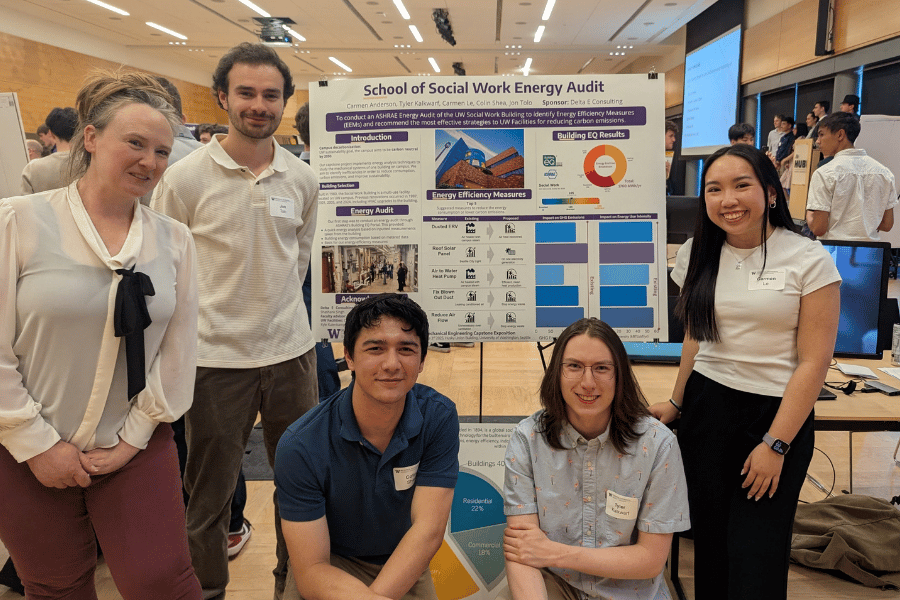October 13, 2025
A mechanical engineering capstone team received top marks in the 2025 Building Energy Quotient competition, sponsored by the American Society of Heating, Refrigerating and Air-Conditioning Engineers (ASHRAE).

The team at the ME capstone expo. Photo by Matt Hagen.
The team of undergraduate students evaluated the energy consumption of the UW School of Social Work building and recommended improvements to its efficiency. This research, sponsored by Delta E Consulting, was key to their winning submission.
“Being recognized for our work is validating and a testament to the ME capstone program, which gives students professional experience,” says team member Carmen Anderson (BMSE ’25). “Our industry mentor Andi Burnham was very knowledgeable and expected us to provide high-quality work. I think that showed in our submission.”
Anderson, who helped start the UW ASHRAE chapter, was excited to initiate a capstone project about building systems and heating, ventilation and air conditioning (HVAC). Scott Rushing, an ME affiliate instructor with HVAC engineering expertise, signed on as their faculty mentor.
The team was inspired by the UW’s goal to decarbonize campus energy systems, which includes assessing existing buildings for opportunities to reduce energy usage and greenhouse gas emissions.
“I was drawn to how the project involved sustainability and thermodynamics,” says capstone team member Jon Tolo (BSME ’25).
Tolo and his teammates took the ME 425 HVAC Engineering class, which complemented their capstone work.
“Buildings are a major source of emissions that contribute to climate change,” Anderson says. “HVAC is a huge industry in Seattle and an area where we can make an impact.”
First, the team met with Delta E Consulting to identify what potential changes could be made in older buildings. They then met with engineers from UW Facilities to discuss the feasibility of doing an audit and selected the UW School of Social Work building as their project focus.
For the past two years, sensors in the School of Social Work building have measured HVAC data – such as temperature, humidity, air flow and steam usage – every 15 minutes. With help from UW Facilities, the capstone team accessed this data and used it to calculate the building’s annual energy usage for their audit.
Each team member presented various recommendations for the building and even made upgrades when possible. For example, Colin Shea (BSME ’25) installed solar panels on the building’s roof, which could reduce the building’s energy consumption and costs.
The audit provided valuable insights into needed improvements, such as the performance of the supply fans in the basement that pump air throughout the building. While looking into the fans’ power consumption, the facilities team found a hole in the ducts that distribute air, uncovering a new problem to fix.
“We found that the fans were potentially delivering twice as much air as was necessary for the building,” Anderson says.
The students also looked at adding an energy recovery ventilator and an air-to-water heat pump.
“Energy recovery tries to recover heat before it’s exhausted from the building. An air-to-water heat pump extracts heat from outside air and transfers it to the heating hot water system,” Anderson says. “We looked at how these systems could reduce the building’s carbon footprint.”
Students said working with UW Facilities engineers, who led a tour of the equipment room, was a highlight of the project.
“The capstone wouldn’t have happened without them,” Tolo says.
Anderson hopes the project will inspire future students to take part in building decarbonization initiatives at the UW. Tyler Kalkwarf (BSME ’25) and Carmen Le (BSME ’25) also worked on the project and received the ASHRAE award.
“It was nice to get something rolling for future students to be able to get involved in the UW’s carbon reduction goals,” Anderson says. “As students continue to build the ASHRAE club on campus, this project was a great test drive to see how we might continue to work with facilities engineers on campus.”
Rushing says industry sponsor Delta E and the UW Facilities personnel who contributed time and expertise were key to the capstone team’s success.
“The project became a mutually beneficial arrangement as a result of everyone’s efforts,” he says.
ASHRAE at the UW
Reach out to the UW’s student chapter of ASHRAE at uwsashrae@gmail.com. The registered student organization meets regularly during the school year and keeps members informed about HVAC events, career resources and more.
Industry Capstone Program
The Industry Capstone Program brings together UW College of Engineering students and professionals to tackle real-world, interdisciplinary engineering problems. Sponsors bring in projects from their organizations and provide support to teams of creative and talented engineering students who design and build innovative solutions.